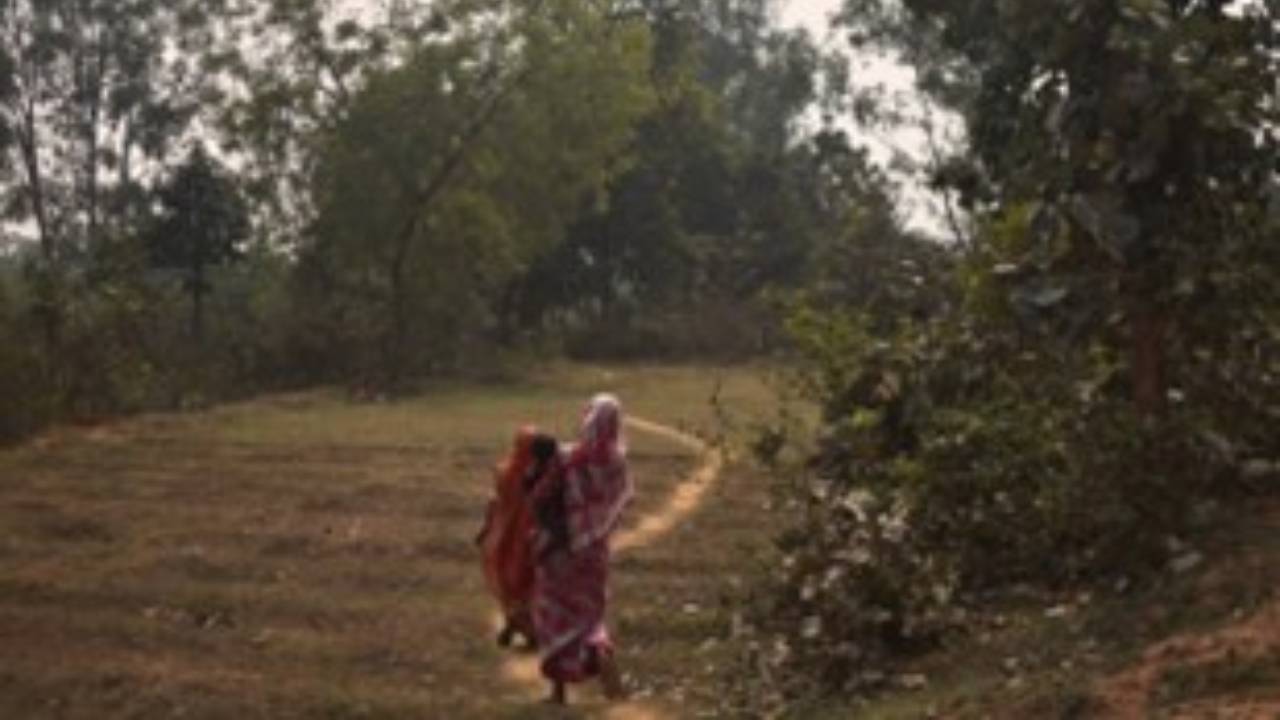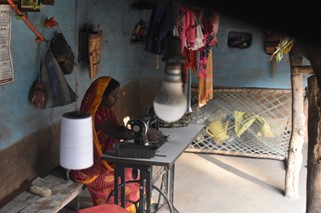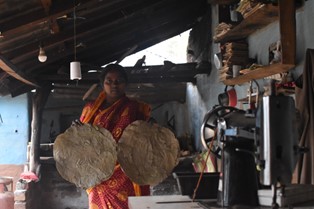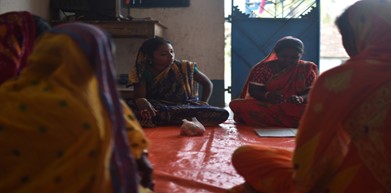Stitching Success: Weaving a Sal-tastic Tale of Triumph!
Akshay Bhagwan Dabhade, Khatra, West Bengal

Fig. Undulated land; rugged terrain of Khejurkhenma
In the rugged terrain of Khejurkhenma, a tiny village in the Ranibandh block of Bankura district, a transformation has unfolded, spearheaded by the indomitable Shivani Mukhyato Pal, affectionately known as Shivani Didi. Her journey from an ordinary villager to a catalyst for change is a living proof to the power of resilience, income diversification, and community impact.
Challenges? Several!
Khejurkhenma, with its rocky landscape and reliance on unpredictable agriculture, faced perennial challenges such as seasonal rain constraints, low productivity, and low crop prices due to far away marketplaces and market intermediaries.
Shivani Didi, managing with limited land holdings of scarcely an acre, wrestled with the task of sustaining her family's livelihood. Her spouse, Mukhyato Pal toiling as a carpenter, brought in a meager supplementary income, averaging a mere 30-35 days a year. With an annual income of around INR 60,000, it was a herculean task to support a family of four, including Shivani Pal, Mukhyato Pal and their two daughters. As if the existing trials weren't enough, the sudden demise of Shivani Didi’s sister burdened her with the responsibilities of education and medical support of her sister’s family as well.
“Onek asuvidha chilo, badite 4 te log aache. Sabaikar khabar, podhashona, aushud ki have jugaad hobe?” (We faced immense hardship, with so many mouths to feed in our household. How could we manage food, education, and healthcare for everyone?”) reminisces Shivani, reflecting on bygone days. Mukhyato Pal migrated to another city in pursuit of better income, leaving the entire household and land responsibilities on Shivani didi. While the family income saw a slight improvement, it still fell short of affording a dignified existence.
A new START for Shivani
The START (Stimulating Tribal and Rural Transformation) project in collaboration with RBL Bank Ltd. supported PRADAN in understanding the struggles faced by the villagers of Khejurkhenma. The intervention’s primary goal was to break the village’s dependence solely on agriculture, recognizing the need for a sustainable income source to uplift low-income families.
PRADAN, understanding the local context, decided to intervene by focusing on Non-Timber Forest Products (NTFP) and value addition. After market research on the sal enterprise, women interested in stitching were identified and provided with seven days of training and stitching machines. Shivani, part of the training, seamlessly transitioned from collecting leaves to crafting valuable products. The producer group she formed now collects leaves, stitches them into plates and bowls, generating a substantial monthly income.

Fig. Shivani Mukhyato Pal working on Sal Leaves
“Jokhon amake training pei geyechi, aami bujhate parlam ke Sal Patta kache modhe onek rojgar ache. START project niye aami byawsay bujhlam, gramer onya didi der ke jodo korechilam aar kach ta shuru korlam” (The training helped me understand the importance of Sal leaves in earning a substantial income. I understood the ways to explore and handle the business via the START project, formed a collective of women from the village and started working on the same), says a visibly beaming Shivani Pal in between one of the meetings of the Sabhuj Sathi Utpadankari Samiti Producer Group founded by her and the 26 women members from the village.
The Fruit of Labour
The products churned out by the Sabhuj Sathi Utpadankari Samiti Producer Group find their way to Ranibandh Mahila Farmer Producer Company Ltd., another entity fostered by the START Project, which further sells them to various stakeholders like West Bengak Khadi and village industries board, ISKCON (Mayapur temple), few vendors in Siliguri, and other institutional buyers.. Moreover, the stitching skills acquired through the project have opened doors to additional orders, like stitching uniforms for Barikul Sangh, a Cluster Level Federation office. The intervention has bolstered her monthly income by an additional INR 2,500. The skills she acquired have provided her with an annual livelihood support ranging from INR 30,000 to INR 40,000.

Fig. Shivani didi with stitched Sal leaves
The ripple effects of the project resonated profoundly in Shivani's life. Financially, she not only met her family’s immediate needs but also funded her daughter, Parvati Pal’s education and wedding. The additional income proved indispensable during a medical crisis requiring her daughter’s appendectomy. Shivani became the linchpin for the livelihoods of 26 women with the formation of a successful producer group.
Lessons Learned
At the heart of this success story lies a crucial lesson—the transformative potential of income diversification in rural landscapes. Shivani's journey serves as an example, emphasizing the need of empowering individuals for sustainable development and fostering multiple income generation avenues.
Conclusion
“Akhon poristhiti onek ta bhalo. Bhalo aay korte perechi bole Amar bor badi phire chole eseche. akhon du jane mile porivaar ta ke samblaaye, chas kori abong Sal Patta toyeri kori” (Our lives have taken a turn for the better now. We have a steady income, and my husband (Mukhyato Pal) has returned home. Together, we tend to our family, work the fields, and craft products from sal leaves),” shares Shivani Pal, who now stands shoulder to shoulder with her spouse, a scenario once deemed unimaginable. Shivani Mukhyato Pal has finally found her voice.

Fig. Shivani Pal at a Producer Group level meeting in Khejurkhenma

